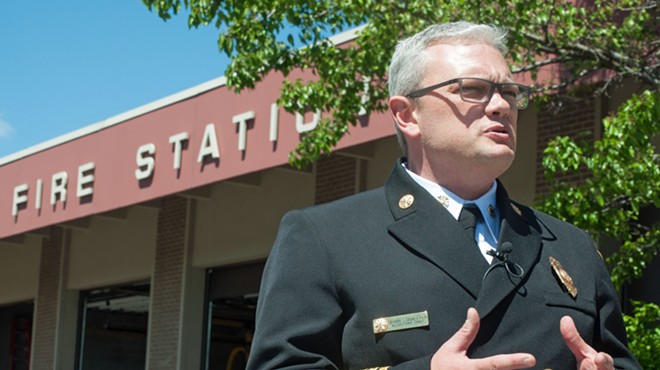Something inside of Christopher Parker tells him he needs help. He feels sick. His mind races. His breathing comes in gasps as he fumbles for his phone at 3:14 am outside an apartment building in Browne’s Addition. Between hysteria and hallucinations, he manages to dial 911.
“Hello, this is 911,” the operator answers. “What’s going on there?”
“I don’t know,” Parker says.
“Where are you at?” she asks.
“I don’t know.”
Parker, a 33-year-old drywall contractor, says he’s lost and confused. He needs an ambulance, he says, but can’t explain where. He feels trapped. He’s seeing things, people chasing him and trying to shoot him.
“I did too much meth or something,” he admits. “I don’t know what I did. I’m scared.”
Patiently, the operator coaxes answers out of him for about 20 minutes. He drops off at times, talking to himself. He swears and grunts, struggling to clear his head.
“Chris,” she says, asking him to focus. “We’re trying to help you.”
Parker’s desperate, early morning 911 call on Feb. 24 sets in motion a series of decisions ending in his death less than three hours later. Multiple choices, big and small, direct him through the system, away from a hospital to the Spokane County Jail, and later into cardiac arrest.
A decision at 3:39 am medically approves Parker for booking into jail. A decision at about 5 am, partly due to his own struggling, gets him Tasered in jail and strapped into a restraint chair. Minutes later, miscommunication delays an ambulance. By 5:39 am, he is dead.
Assistant Spokane Fire Chief Brian Schaeffer, who reviewed the death for the fire department, says emergency responders follow certain protocols to protect people, to get them the help they need. Parker slipped through those protocols.
“Probably 99 percent of the time the story ends like we would expect,” Schaeffer says. “In this case, the holes in the Swiss cheese were completely aligned.”
From her home in De Queen, Ark., Parker’s mother, Christina Higgins, describes a “good-hearted” son, who encouraged and watched over his younger siblings. He loved children and fishing. He preferred writing letters instead of emails.
Parker grew up in Spokane, working drywall jobs most of the past 10 years. Higgins says nothing was more important to Parker than his two young daughters, 9 and 12, who live with their mother in another state.
She says the first thing people often noticed about Christopher was his brilliant smile.
“He had perfect teeth,” she says. “My other kids did not get that. … It was such a jolly smile.”
But Parker had some issues, Higgins admits. He was convicted of assault in 1998 for breaking a man’s arm. Court records outline a history of temperamental outbursts and drug use.
“Christopher was not a meth addict,” she says. “He would occasionally use it.”
On Feb. 24, Spokane police officers find Parker outside the Park Terrace apartments on Fourth Avenue shortly after 3:30 am, about the same time he hangs up with the 911 operator.
“We’ve got a male that’s on meth and he’s tweaking really bad,” an officer tells dispatch.
His name shows an outstanding civil warrant for overdue child support payments. Officers request a medical check before making an arrest.
Dispatch records show a Spokane Fire medical crew spends about nine minutes evaluating Parker. He tell them he has diabetes. Schaeffer says the crew checks heart rate, breathing and other vitals. Everything is within normal limits, so they clear him to go to jail instead of a hospital.
After later reviewing the incident, Schaeffer explains ambulance crews often consider the jail an advanced level of medical care because the jail has registered nurses on staff. He says the crew believed the jail nurses could manage any unexpected issues.
“We definitely could have done things better,” Schaeffer says now. “Great people providing great care can make errors. … We’re not hiding from it.”
Shortly before 4 am, officers arrest Parker, loading him into a patrol car for the short drive to booking at the Spokane County Jail.
Surveillance video of the booking area shows Parker wearing a white T-shirt and dark shorts. He’s cooperative, but at times he appears restless, pacing in circles and rubbing his short-cropped hair.
Several corrections deputies roam the fluorescent-lit row of holding cells. A nurse in a floral scrub top leans against the front counter.
Deputies put Parker into a holding room at about 4:10 am, where he sits for about a half hour before being brought out for processing. He seems more anxious now. He fidgets and fumbles with his jacket.
When a deputy motions for Parker to return to the holding room, he hesitates. The video shows a second deputy step in behind him to escort him forward and Parker tenses up, stumbling to the floor.
Deputies help him up and pull his arms behind his back. They march him down an adjacent hallway to a small, individual holding cell. His figure blurs into broken pixels as he moves away from the camera.
Capt. John McGrath, commander of Detention Services, says jail staff uses the individual cells to isolate certain inmates. As they moved Parker into a cell, he started “wrestling” with deputies.
The blurry video shows deputies struggling in the doorway. At some point, deputies reportedly use a Taser on Parker. A deputy brings over a restraint chair, an angled metal chair with straps across the arms and chest to hold down inmates.
McGrath says jail deputies only use a Taser when verbal commands have failed. He says a Taser is used to avoid potential injuries from a physical scuffle between inmates and jail staff.
Deputies strap Parker in the restraint chair shortly after 5 am. He loses consciousness moments later, and goes into cardiac arrest.
A jail employee makes the first of three 911 calls for an ambulance at 5:11 am, reporting a possible drug overdose. The dispatcher asks if Parker is awake and alert, but the jail employee cannot say. He’s calling from a different room. Two nurses are with Parker.
The call goes to American Medical Response for one of their private ambulance crews, according to dispatch records. It’s dispatched as non-emergency. No lights or sirens needed. The crew takes five minutes to get on the road.
After 11 minutes without an ambulance, the jail calls back a second time. The dispatcher confirms an ambulance is en route, but asks for any new medical details.
“You can’t even tell me whether they were conscious and alert, or an age,” the dispatcher says sharply. “I asked you that information, you said you didn’t have it. Do you have that information now?”
“Well,” the jail employee answers, “it’s an unconscious male, 30 years of age, possible O.D.”
“Unconscious male makes a big difference,” she says.
Video shows jail staff huddled around Parker on the floor of the hallway. Deputies hurry back and forth with medical bags and latex gloves. The AMR crew rolls in with a gurney at 5:23 am and takes over resuscitation efforts from the jail nurses and staff.
After AMR arrives, the jail makes a third call asking for extra assistance from Spokane Fire medical crews.
Schaeffer acknowledges emergency responders had “very vague and very limited” information on Parker’s condition. “It was very chaotic,” he says of the situation, but he argues the jail had medical personnel by Parker’s side, and it’s unlikely a quicker ambulance response would have changed the outcome.
Just as fire crews pull into the jail, the AMR crew pronounces Parker dead at about 5:39 am.
The Spokane County Medical Examiner’s Office later listed the manner of Parker’s death as homicide. An autopsy concluded the primary cause of death was methamphetamine toxicity, but indicated the “physiologic effects of restraint” contributed to his demise.
The Washington State Patrol has overseen the investigation into the death. Trooper Jeff Sevigney says detectives have interviewed all jail deputies and inmates present during the incident.
“The investigation is fairly complex,” he says. “We had a lot of witnesses. … Obviously we want to do a thorough job.”
Any findings will eventually get passed to the Spokane County Prosecutor’s Office for review. The prosecutor will determine whether any negligence or criminal action was involved.
Parker’s family filed estate records indicating “a claim may be pursued regarding a wrongful death claim.” Attorneys for the family declined to comment, saying any statement before the State Patrol completes its investigation would be premature.
Following his review of the incident, Schaeffer announced a new policy. Any patient who has ingested an unknown substance will now go to a hospital for assessment. He hopes the extra safeguard will help medical crews err on the side of the patient’s safety.
Schaeffer says he has since met with jail officials to clarify what information emergency crews need on 911 calls. He has also changed department policy to send fire crews along to all medical calls at the county jail.
“We’re taking the opportunity to actually improve the system,” he says.
While she waits for the final word in her son’s death, Higgins holds tight to his memory. He never once missed a call on Mother’s Day, she says. His absence weighed heavily on the recent holiday.
“I knew it was going to be [hard],” she says, her voice catching. “He never forgot, even if it was 11:59 pm.”
She consoles herself with his old letters. She reads through his old journals and gazes fondly at a photo of him with a wide grin.
“His smile,” she says. “That’s what I’ll remember.”






















